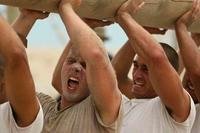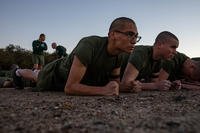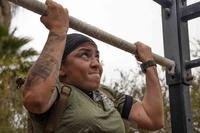As Army Chief of Staff Gen. George W. Casey Jr. stresses the Comprehensive Soldier Fitness Program, the U.S. Army Sergeants Major Academy finds itself at the tip of the spear in offering health and fitness insight to its enlisted members.
Senior Army leadership not only wants a broadly skilled NCO treading the battlefields of tomorrow, but one that is both physically and spiritually fit. The former is a product of fitness regimens designed to enhance a soldier's ability to withstand the stresses and challenges of today's real-world operations tempo -- and diet, not surprisingly, is a major piece to the puzzle.
"The food choices you make and when you eat have a direct impact on your energy level, ability to concentrate, overall feeling of well-being and gut function," said Jennifer Eiland, a dietician and part of the Army Physical Fitness Research Institute's staff at their USASMA annex. "It also affects your ability to complete an exercise session."
Casey, it should be noted, is so big on soldier fitness that he's made the CSF Program, established in 2009, a priority as the Army tries to focus on the five dimensions of strength: physical, emotional, social, spiritual and family.
The general's intent is to increase the strength, resilience and enhance performance of all soldiers, family members, and Department of the Army civilians. None of it is possible if this old quip -- "You are what you eat" -- makes sense, and everyone is shoveling junk food down their necks.
"Diet is extremely important to realizing health and fitness goals," Eiland said. "It influences almost three-quarters of the results of our health assessments. It can also influence a person's aerobic capacity; heavier participants typically have lower V02 or lung efficiency as a result. Mood and alertness are also affected by diet."
Eiland stressed that eating a diet full of sugar, salt and fat lowers one's energy level and ability to concentrate, which, in turn, can affect schoolwork and a soldier's performance negatively.
"It affects chronic disease risk on a number of levels as well," Eiland said. "Obesity increases the odds of contracting cancer, diabetes, heart disease and high blood pressure. Excessive sodium intake can increase blood pressure in over two-thirds of the population and risk of stroke and heart attacks, according to the latest from the American Heart Association and Centers for Disease Control."
In a recent letter to the troops, Sgt. Maj. of the Army Kenneth Preston emphasized the need for soldiers to work on all five areas stressed by the CSF program, most of which can be affected by diet.
"We want CSF activities to become a part of our daily lives, just as we do physical training every day to build and strengthen the physical dimensions of CSF," Preston said in his letter. "We want the members of our team to do more than just cope with adversity; we want them to grow from their life experiences.
"Reflecting on the past eight years of war and our deployment experience in Afghanistan and Iraq, we can now begin to understand the individual health and resilience problems associated with our deployment tempo," he said.
An unhealthy soldier is less effective, Eiland said.
"A sergeant major's overall health, including how he or she eats, influences their ability as leaders ... and the influence they have on the health choices of their young soldiers," Eiland said.
Eiland pointed out that a prominent group of retired military leaders want junk food taken out of America's schools because the obesity epidemic, especially in young people, is limiting the number of people who can be recruited into the military. It is making obesity a national security issue.
On a positive note, she added that many soldiers have a sincere interest in improving their eating habits.
"A good majority tend to eat more meat and fewer fruits and vegetables than is considered optimal for good health," Eiland said. "Including more whole grains and less processed foods is also an area I frequently discuss with soldiers. Sugary beverages seem to be a favorite, as is eating fast food and microwave meals, given their busy schedules. However, if dietary changes are presented in a practical and doable way to them, most will make changes."
The major challenges, according to the dietitian, are getting organized and planning ahead.
"Enlisting uncooperative family members, finding time to cook their own meals and changing an old mindset are also challenges," she said.
Want to Learn More About Military Life?
Whether you're thinking of joining the military, looking for fitness and basic training tips, or keeping up with military life and benefits, Military.com has you covered. Subscribe to Military.com to have military news, updates and resources delivered directly to your inbox.



















